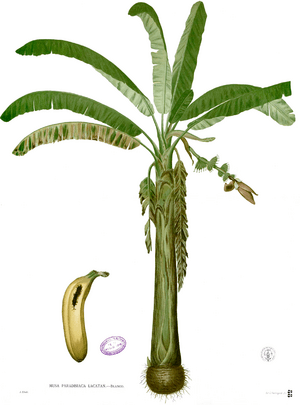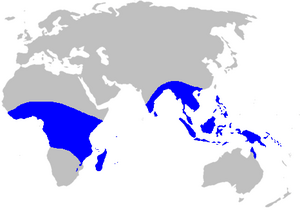Musaceae facts for kids
Quick facts for kids Musaceae |
|
|---|---|
 |
|
| Musa acuminata | |
| Scientific classification | |
| Kingdom: | |
| (unranked): | |
| (unranked): | |
| (unranked): | |
| Order: | |
| Family: |
Musaceae
|
| Genera | |
 |
|
| Musaceae distribution | |
The Musaceae are a family of flowering plants that grow in warm, tropical parts of the Old World (like Africa, East Asia, and Australia). These plants are very large herbs, which means they don't have woody stems like trees. Instead, their big leaves grow in a way that makes a false stem, making them look like trees.
Many plants in this family, especially bananas and plantains, are grown all over the tropical world for their delicious fruits.
Contents
What are Musaceae Plants Like?
These plants are perennial herbaceous plants. This means they live for more than two years and don't have woody stems. They aren't super tall, but their leaves are huge! The lower parts of these big leaves are packed together tightly. This forms a false stem, called a pseudostem, which isn't made of wood.
The plant's true stem actually grows underground. It's called a rhizome or a corm. After a false stem flowers and makes fruits, it dies. But don't worry! New false stems grow from the underground corm to replace them.
Flowers and Fruits
The flowers of Musaceae plants have special leaf-like parts called bracts. They grow in groups, which scientists call inflorescences. These flowers are pollinated (which means they get help to make seeds) by many different creatures. These include insects, birds, bats, and even treeshrews.
The fruits are a type of berry and usually have many hard seeds inside. However, the bananas and plantains you buy in stores are special. They don't have seeds because they are sterile. This means they can't make seeds on their own.
Genera of Musaceae
The French botanist Antoine Laurent de Jussieu was the first to officially name this plant family in 1789.
There are three main groups, or genera, in the Musaceae family:
Sometimes, scientists group Musella together with Ensete. This shows how plant classification can sometimes change as we learn more!
How We Use Musaceae Plants
The most famous use of Musaceae plants is for their fruits, like bananas and plantains. We eat them fresh, and they are also used to make other products, such as alcohol and flour.
Besides food, some Musa species are very important for their fibre. This strong fiber is used to make things like abacá (also known as Manila hemp), which is used for ropes, paper, and fabrics.
See also
 In Spanish: Musáceas para niños
In Spanish: Musáceas para niños
 | Aurelia Browder |
 | Nannie Helen Burroughs |
 | Michelle Alexander |

